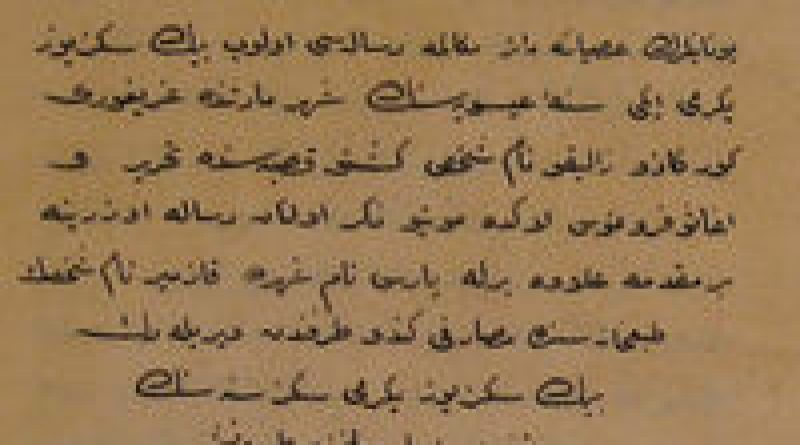The Ottoman dimensions of 1821
The statement that the Greek Revolution of 1821 had Ottoman dimensions may sound surprising initially. However, both the struggle and its protagonists were “products” of Ottoman society and its developments, since they were created within its framework. Therefore, any interpretation of 1821 would be incomplete without investigating the historical context in which it broke out. However, the Ottoman dimensions of the 1821 Revolution are not limited to examining pre-revolutionary society, as in recent years several scholars have studied Ottoman archives, which provide rich material on the Ottoman administration’s reaction to the “Rum Millet” revolutionaries.
To start with the examination of the pre-revolutionary society, Vaso Seirinidou, assistant professor of the history of modern Hellenism at the University of Athens, analyses the factors that led to the outbreak of the revolution in a talk entitled “The pre-revolutionary Greek society”, presented in the lecture series “21 Lectures on 1821” organized by her university.[1] Paraskevas Konortas, associate professor of Ottoman history at the University of Athens, offers a similar analysis, from the perspective of the Ottoman administration however, in his talk, “Ottoman rule in Southeastern Europe before the Greek Revolution”, which highlights the internal strife between central government and regional authorities.[2]
Continuing with the same theme, the aim of the discussion of the Institute for Mediterranean Studies, which is part of the FORTH series of talks marking the bicentenary of the revolution, is to highlight the Ottoman aspects of 1821. Marinos Sariyannis, director of research at the institute, analyzes the outbreak of the revolution as an Ottoman event in the light of the gradual alienation of Christian subjects, especially in the janissary corps. Next, Şükrü Ilıcak, a postdoctoral researcher at the institute, presents Ottoman society in the decade before 1821, while Leonidas Moiras, lecturer of Ottoman history at the University of Athens, examines the transition from the term “Rum Millet” to the term “Yunan”, which suggests that the revolutionaries moved from a pre-modern, religious identity to a modern, national one.[3]
Next, regarding the second topic, that of the archival research in Ottoman archives, Parakevas Konortas describes the reactions of the Ottoman administration through the three types of Ottoman sources – sultanic decrees, administration reports, and narratives, such as chronicles and memoirs – which contain useful information, both about the attempts of the Ottomans to suppress the revolution and about the revolution itself.[4] On a similar path, the Center for Liberal Studies (KEFiM) podcast with the authors of the book The sultan’s wrath: The Greek Revolution through the eyes of the Ottomans (2021, Hellenic Open University Publications) – Elias Kolovos, associate professor of Ottoman history at the University of Crete, Şükrü Ilıcak (see above) and Mohammad Shariat Panahi, assistant professor of Ottoman and Islamic history at University of Thessaly – focuses on the issue of the decrees of Sultan Mahmut II.[5]
Moreover, at the event entitled “The Greek Revolution through the Eyes of the Ottomans”, held as part of the Public bookstore’s series “Discussions on Freedom, 1821-2021”, Elias Kolovos, Leonidas Moiras and Christine Philliou (professor of history at Berkeley University), talk about their books The sultan’s wrath and Biography of an empire (Alexandria, 2021).[6] Additionally, Philliou talks about the aforementioned book and analyses the Ottoman aspects of the Phanariotes in her lecture at the event “1821 from the East”, organised by the Gennadius Library.[7]
Finally, for those looking for a discussion in English on the topic, the 2021 Delphi Economic Forum included a panel entitled “Ottoman Views of the Greek War of Independence”. There, Ioannis N. Grigoriadis, associate professor at Bilkent University, talks about how the 1821 Revolution transformed the identity dynamics of the Ottoman Empire, in general, and the area of Syria in particular. Next, Hakan Erdem, professor of history at Sabanci University, describes the reception of the Greek War of Independence by the Ottoman authorities. Then, Şükrü Ilıcak analyses the Greek Revolution in its imperial – Ottoman – context through the study of Ottoman archival material and Christine Philliou talks about the case of Greek Orthodox Christians, and more specifically Phanariots, who chose to remain in the Ottoman Empire as Ottoman subjects after the establishment of the Greek state.[8]
Konstantina Tortomani, Postdoc researcher in modern and contemporary European history at the Department of History and Ethnology, Democritus University of Thrace
[1] Vaso Seirinidou, “Η προεπαναστατική ελληνική κοινωνία” [Pre-revolutionary Greek society], 10 February 2021, https://youtu.be/W9AwcBViUuQ.
[2] Paraskevas Konortas, “Η Οθωμανική εξουσία στην Νοτιοανατολική Ευρώπη πριν από την Ελληνική Επανάσταση” [Ottoman rule in southeastern Europe before the Greek Revolution], 24 February 2021, https://youtu.be/r3Hzkt6faJM.
[3] Marinos Sariyannis, Şükrü Ilıcak and Leonidas Moiras, “Η ελληνική επανάσταση από τη σκοπιά των Οθωμανών” [The Greek Revolution of 1821 from the Ottoman point of view], 11 October 2021, https://youtu.be/mhqHYkjSjZM.
[4] Paraskevas Konortas, “Οθωμανικές αντιδράσεις στην Ελληνική Επανάσταση: οι οθωμανικές πηγές” [Ottoman reactions to the Greek Revolution: the Ottoman sources], 26 May 2021, https://youtu.be/T7kaAaKTmGA.
[5] Elias Kolovos, Şükrü Ilıcak and Mohammad Shariat Panahi, “Podcast ‘Bicentennial of the Liberal Revolution’ XIΙ”, 29 June 2021, https://youtu.be/AJGedqLPBlU.
[6] Elias Kolovos, Leonidas Moiras and Christine Philliou, “Η Ελληνική Επανάσταση με το βλέμμα των Οθωμανών” [The Greek Revolution through the Ottoman point of view], 26 May 2021, https://youtu.be/RLRFw86m34w.
[7] Maria Mavroudi, Christine Philliou and Marinos Sariyannis, “Το 1821 εξ ανατολών” [1821 from the East], 18 October 2021, https://www.blod.gr/lectures/to-1821-eks-anatolon-1821-from-the-east/.
[8] Ioannis N. Grigoriadis, Hakan Erdem, Şükrü Ilıcak and Christine Philliou, “Ottoman views of the Greek War of Independence”, 19 May 2021, https://youtu.be/Ja9tN-dfeGk.

